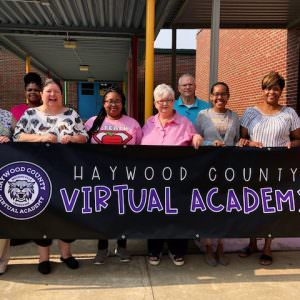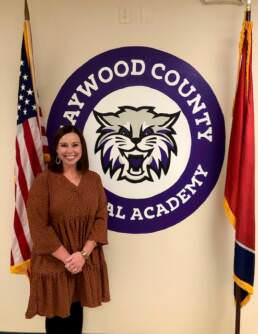Haywood County Virtual Academy – Providing Non-Traditional Learning Options for Students and Families in Haywood County
In March of 2020, the shape of education in the state of Tennessee changed forever.
Because of the outbreak of COVID-19, many school districts across the state left for Spring Break on a Friday and never returned to campus until August. The pandemic forced school districts to be creative and innovative with the ways they provided instruction to students while schools were closed during the Spring. With COVID still very active when school was scheduled to begin in August of 2020, a virtual option was offered to families. In Haywood County (HCVA), nearly 1,000 students took advantage of the virtual school option.
As the 2021 school year approached, state legislation required students to learn in-person unless local districts provided a state-accredited virtual option. In order to meet the needs of every student in the district, Haywood County Schools established the Haywood County Virtual Academy, and chose Brittany Pittman to lead the program.
Growing up in Hattiesburg, Mississippi, Brittany knew she always wanted to be a teacher but briefly considered a career in dentistry in college.
“When I was a kid, I wanted to be a teacher. I went to college, though, to be pre-dental and found out quickly that I’d rather go into education,” she said.
After graduating from Freed-Hardeman University in Henderson, Tennessee, Brittany accepted a job in Haywood County and has been here her entire teaching career. She says teaching in Haywood County is extremely rewarding because of the focus on students.
“There’s such a focus on the kids here in Haywood County. Everything is for the betterment of the students. That’s the root of every decision made here.” – Brittany Pittman
Because every decision Haywood County Schools makes is truly rooted in the interest of the betterment of their students, opening a virtual option during a pandemic was a priority. What started as a necessity during the 2020-2021 school year became an option of great importance for certain students this year.
One of the many advantages of having the Virtual Academy is the relationships that are able to be built through that particular medium.
 “As a virtual school, we’re forced to build relationships with our students’ families because we’re in the home,” Brittany explained. “We see their parents; we see their siblings. It’s much more of a community in that way.”
“As a virtual school, we’re forced to build relationships with our students’ families because we’re in the home,” Brittany explained. “We see their parents; we see their siblings. It’s much more of a community in that way.”
Students in the Virtual Academy use the same curriculum as students who are learning in the physical buildings. While students in the Virtual Academy do submit their assignments and formative assessments online, they will be required to come to campus to take benchmark assessments as well as the TNREADY state assessment in the spring.
“Students will come to campus to test. We collect data in several different ways during different times of the year and virtual students will report to campus for that testing. It’s good practice for the state test in the spring that they’ll have to take in-person,” Brittany said.
Even though having a full-time virtual option has many advantages, Brittany and her staff of teachers have encountered some challenges that they’re working through as those challenges arise.
“Because we’re virtual, we’re trying to establish some boundaries as far as time is concerned. Sometimes teachers will get emails late at night or during times with their families and we’re working on ways to teach them to establish some boundaries,” she said.
One way those boundaries have been established is adding “office hours” to virtual teachers’ schedules. During these hours, students and parents can interact with a teacher on a one-on-one basis and get clarifications on assignments or extra help on a lesson. This is one way a challenge has been turned into an advantage. Office hours are also used to check on students who may not have joined class on a particular day.
“Teachers have daily office hours. This is when students can reach out if they’re having any issues or need some extra help,” Brittany said. “The teachers also use that time to call families of students who may not have logged on that day or may not be turning in assignments as much as they should be. We’ve tried to build in some extra time for teachers so that they can support their students.”

Support is at the heart of the Virtual Academy on every level. Teachers supporting students. Administration supporting teachers. The HCVA, itself, supporting the community by offering innovative options for learning.
Before her appointment as the principal of the Virtual Academy, Brittany served as the Instructional Coach at Haywood Elementary School. Her time in that position helped her learn different ways to support teachers in the classroom. Now, she’s helping support teachers in a virtual classroom.
“I want to be a support for my teachers – to be able to get something done for them or to provide them with some thinking questions that help them get to where they want to be,” Brittany explained.
Another way that teachers at the Virtual Academy feel supported is through peer to peer interactions with their colleagues. Last year, teachers who taught virtually were able to teach from home. This year, however, the Virtual Academy is housed in the tornado safe building at Haywood Elementary School. Teachers have their own rooms and computers to teach their students, but they are able to meet together for Professional Learning Communities (PLC’s) and informal conversations.
“Teachers all work from the building and that helps to build relationships. They can have those hallway conversations and informal connections to talk about how to best meet the needs of their students. We do our PLC’s in the buildings, and it helps so much for that discussion to take place in person,” Brittany said.
Educational systems, in general, are steeped in tradition. Tradition can be comfortable, but there also comes a time to progress for the betterment of the student population. That change may happen organically or it may take something like a pandemic to accelerate the process. Regardless of the reasons, change is bearing down on education in a major way.
The Haywood County Virtual Academy is an innovative way to move forward in delivering instruction in a non-traditional way for students who need a different option rather than learning in a physical classroom.
Most districts in West Tennessee chose not to offer that option and Haywood County is able to meet needs of students outside the district as well.
“We have a student from Millington, Somerville, and one coming in from Paris. We offer it to anyone in the state. We have a few from Jackson that are enrolled, too,” Brittany explained. “Once these students are enrolled in our program, they count as students in our district.”
Just because something has been done a certain way for a long period of time doesn’t necessarily mean that it’s the most effective or most equitable way of serving a population. Families need options. Students need options. Especially during a time like this. The Haywood County Virtual Academy provides options and opportunities for students and families who need them.


